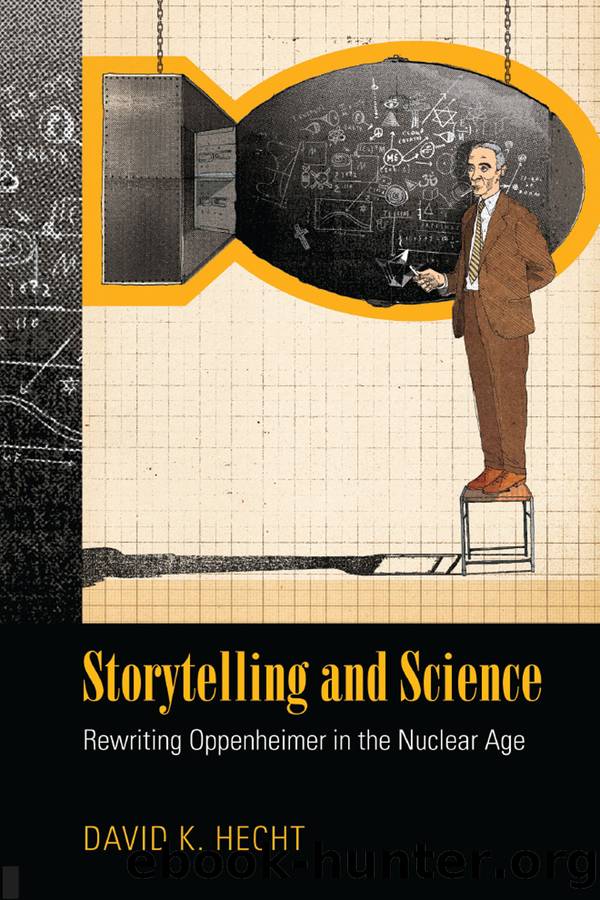Storytelling and Science by David K. Hecht

Author:David K. Hecht
Language: eng
Format: epub
Publisher: University of Massachusetts Press
Published: 2015-08-15T00:00:00+00:00
CHAPTER 4
The Making and Unmaking of Faust
The legend of Faust hovers over modern science. Since first appearing in an anonymous German chapbook printed in the late sixteenth century, the character has become almost synonymous with scientific hubris. In most renditions, Faust is a scholar whose outsized desire for knowledge prompts him to make a pact with the devil, a bargain that has unforeseen and unfortunate consequences. Authors differ in the severity of their moral judgment, but at the core of most versions is a scientist or other knowledge seeker who reaches beyond the bounds of human understanding. Writing of Christopher Marloweâs retelling, Roslynn D. Haynes says, âfrom the beginning, he presents what has come to be seen as the archetypal dilemma of the Faust figure: his Renaissance-humanist longing to transcend the limitations of the human intellect is accompanied by a medieval awareness that such longing is doomed to failure.â1 This duality is at the heart of the Faust tradition. Of course, it is not the only legend to wrestle with the notion of knowledge as dangerous; Mary Shelleyâs Frankenstein is another classic incarnation of an old theme. But the Faust legend is particularly relevant for understanding nuclear science. The original Faust dabbled in alchemy, and the nexus of science and magic at the heart of the alchemical tradition has frequently been associated with atomic scientists.2 Thus, the emergence of Faustian themes in nuclear discourse reflected a deep intellectual tradition, not a knee-jerk reaction to powerful new technology.
The Faust legend is relevant to both our understanding of Oppenheimer narratives and their significance during the nuclear age. Its use marked a change in the nature of Oppenheimer appropriations as writers slowly began to de-emphasize politics in favor of commentary on the nature and meaning of modern science. Central to this discourse was the notion of tragedy. The human nature of Faustâs dreams and frailties lends itself to tragic narrative, and Oppenheimer in such formulations became a means of exploring what Haynes sees as the archetypal Faustian clash between âRenaissance-humanist longingsâ and âmedieval awarenessâ of failure. Certainly, not all appropriators considered Oppenheimer to be a Faust figure; and when reading narratives, we must recognize both the âunmakingâ and the âmakingâ of the legend. But those who did not see him as Faustian still had to wrestle with the theme. The security hearing had introduced the notion of personal tragedy into Op-penheimerâs story, and narrators were forever after confronted by this legacy. Some continued to tell martyr tales in which he was a proxy for political debate; others drew closer to questions about scienceâs proper place. For these latter commentators, Oppenheimer could serve as either a positive model or a problematic one. But in all cases, the stories increasingly had a Faustian edge. By the time of his death in 1967, his appropriators had become as concerned about the dangers of technology as with the dangers of the state.
Download
This site does not store any files on its server. We only index and link to content provided by other sites. Please contact the content providers to delete copyright contents if any and email us, we'll remove relevant links or contents immediately.
The Complete Stick Figure Physics Tutorials by Allen Sarah(7358)
Secrets of Antigravity Propulsion: Tesla, UFOs, and Classified Aerospace Technology by Ph.D. Paul A. Laviolette(5360)
Thing Explainer by Randall Munroe(3927)
The River of Consciousness by Oliver Sacks(3590)
The Order of Time by Carlo Rovelli(3175)
How To by Randall Munroe(3095)
A Brief History of Time by Stephen Hawking(3011)
I Live in the Future & Here's How It Works by Nick Bilton(2977)
What If?: Serious Scientific Answers to Absurd Hypothetical Questions by Randall Munroe(2691)
The Great Unknown by Marcus du Sautoy(2680)
Midnight in Chernobyl by Adam Higginbotham(2530)
Blockchain: Ultimate Step By Step Guide To Understanding Blockchain Technology, Bitcoin Creation, and the future of Money (Novice to Expert) by Keizer Söze(2475)
Networks: An Introduction by Newman Mark(2397)
The Meaning of it All by Richard Feynman(2338)
Easy Electronics by Charles Platt(2322)
The Tao of Physics by Fritjof Capra(2258)
Midnight in Chernobyl: The Untold Story of the World's Greatest Nuclear Disaster by Adam Higginbotham(2212)
Introducing Relativity by Bruce Bassett(2111)
When by Daniel H Pink(2106)
